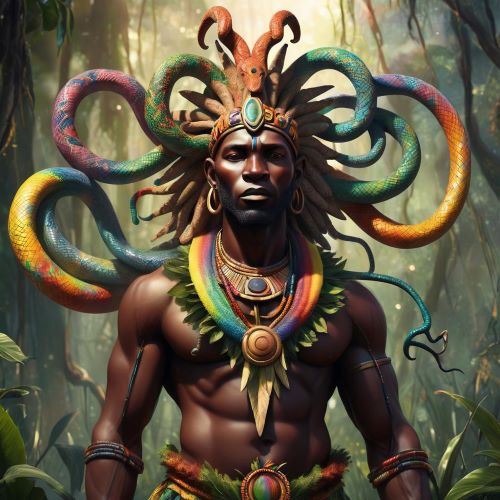Mbuti & Twa Mythology
Mbuti and Twa mythology reflects the profound relationship these Central African forest-dwelling communities have with nature, ancestors, and the spiritual world. The Mbuti of the Ituri forest and the Twa, often linked to the wider Great Lakes region, both developed mythological traditions that highlight their dependence on the forest as a life-giving and sacred presence. Their myths portray the forest as a living entity, protector, and provider, embodying both benevolent and sometimes mysterious qualities. This close connection to the natural environment shaped their spiritual worldview, where animals, rivers, and trees carried symbolic meanings, and where spirits often took on forms tied to the wilderness around them.
In Mbuti mythology, the forest itself is often regarded as a deity-like presence, central to the community’s identity. Their rituals and stories emphasize harmony with the forest, which is seen as both mother and father, nurturing life and providing guidance. The Mbuti also practice communal rituals, such as the molimo ceremony, in which music, song, and dance are used to awaken and honor the spirit of the forest during times of misfortune. Myth and ritual are therefore inseparable, serving both as expressions of gratitude and as mechanisms to restore balance when illness, death, or hardship disrupts community life.
The Twa, who are found across Rwanda, Burundi, Uganda, and the Democratic Republic of Congo, similarly carry mythology that reflects their forest heritage, though their traditions have often blended with those of neighboring Bantu-speaking groups. In Twa mythology, ancestral spirits play a central role, and rituals often involve offerings to maintain harmony between the living and the dead. Some myths also recount the origins of the Twa as forest children chosen by the spirits to live in close unity with nature. This worldview placed great importance on hunting and gathering rituals, where animals were often seen as spiritual gifts that required respectful treatment. Over time, Twa mythology absorbed elements of surrounding cultures while still retaining its unique reverence for the natural environment and its ancestral spirits.
Together, Mbuti and Twa mythology presents a spiritual system that is deeply rooted in ecology, kinship, and the continuity of life. These traditions emphasize the interconnectedness of humanity and the environment, portraying the forest not as a resource to dominate but as a sacred presence that sustains existence. Despite historical challenges and pressures from outside communities, the myths and rituals of the Mbuti and Twa continue to survive as oral traditions, passed down through stories, songs, and ceremonies. They serve as reminders of a worldview that honors balance, respect, and reverence for the natural world, offering enduring lessons in how mythology and culture can embody humanity’s relationship with its environment.



